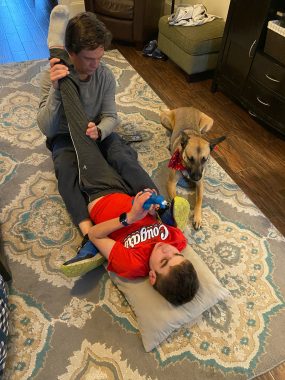The Hard Part Is Not What We Thought It’d Be
Sanfilippo carries with it expected burdens, plus the insurance bureaucracy

When people learn what Sanfilippo syndrome is and that our 12-year-old son has it, their reactions are immediate.
“Oh, I’m so sorry.”
“I can’t even imagine.”
“That must be so hard.”
Sanfilippo is a devastating disease. There’s no way around that. It’s devastating to the child, feeling frustrated as their mind and body work against them, incapable of understanding why they’re losing skills and words they once had. It’s devastating to families — mothers, fathers, siblings, and grandparents — who, expecting to watch a healthy child grow to an adult, are now forced to watch a child regress before their eyes.
But strangely, what should be the hardest part of the disease actually isn’t. Having your child diagnosed with a terminal condition and watching his personality and abilities stripped away, bit by bit, every day should be the hardest part. That should be the part that consumes my energy and haunts my thoughts.
However, that’s the part I’ve learned to live with. That’s the part that, upon diagnosis, I knew to expect. It became our reality, a part of our journey. We thought we knew the hardships that we’d face.
We were wrong. Living with the disease isn’t the hardest part. The hardest part is living with all the roadblocks that bar our son, Will, from the care he needs for a high quality of life.
Even before Will’s diagnosis, when we knew there was something different about him but didn’t know what, he was able to qualify for therapies. He’s been receiving speech therapy, occupational therapy, and physical therapy twice a week since 2014. For Will’s age and condition, he’s doing remarkably well, and we firmly believe that consistent therapy is one of the contributing factors to his quality of life.
He’s still able to walk and maneuver on his own. He’s still able to play with things that amuse him, and he can feed himself. He still finds ways to communicate and express himself. Even with a regressive medical condition with no approved treatment or cure, Will’s been able to develop and maintain skills because of the work of his amazing therapists.
As he gets older, however, the nature of the Sanfilippo beast and the waste products building up in each and every one of his cells mean that it’s more difficult, even near impossible, for him to gain skills. Slowing regression of skills and maintaining those he has have become our primary focus.
Unfortunately, in the world of private insurance, “maintenance” is a dirty word.
As Will ages and begins to lose skills, we’ve had to fight harder for the therapies that allow him to maintain any of his skills at all. Although his therapists see the benefits Will is receiving and advocate for him to continue twice-weekly sessions in each of their disciplines, we are currently in the middle of appealing insurance denials of services for both speech and occupational therapy, with a physical therapy reevaluation review happening this week.
It’s a constant barrage of phone calls and follow-ups for which we have to stay on top of what paperwork is where and who submitted what, as well as “Did they use the right fax number?” and “What do you mean your office lost it?” Then we start the whole process again, all while our son waits for the services he so desperately needs to be reinstated.
My husband and I do our best to keep him as sharp as we can, but we aren’t therapy professionals and haven’t been trained to adapt techniques based on Will’s responses. Add to that the fact that we just finished (successfully!) appealing for our diapered preteen with the cognitive age of about 2 years to continue to qualify for our state’s Medically Dependent Children Program. This after his yearly review initially resulted in his denial. Sigh.
We. Are. Tired.
All of this takes time and mental energy, two things that we should be giving directly to living our best life with our son, not toward unraveling bureaucratic red tape. It’s exhausting to fight these battles, battles we weren’t prepared for, battles we weren’t aware even existed until our son’s diagnosis.
We thought the hardest part of Sanfilippo was going to be living with the disease, not convincing the powers that be that our son deserves all the supports necessary for him to live his life with the highest quality and most autonomy possible. It’s like we’re constantly fighting to show that Will is worthy of services. It’s tiring, upsetting, and rage-inducing, and it seems like the system just wants to beat you down until you give up.
But we won’t.
Because Will is worth it all.

While sessions with physical therapists are on hold for insurance reapproval, Will’s dad takes over, helping him with stretches and other exercises. (Photo by Valerie Tharp Byers)
Note: Sanfilippo News is strictly a news and information website about the syndrome. It does not provide medical advice, diagnosis, or treatment. This content is not intended to be a substitute for professional medical advice, diagnosis, or treatment. Always seek the advice of your physician or other qualified health provider with any questions you may have regarding a medical condition. Never disregard professional medical advice or delay in seeking it because of something you have read on this website. The opinions expressed in this column are not those of Sanfilippo News or its parent company, BioNews, and are intended to spark discussion about issues pertaining to Sanfilippo syndrome.








Comments